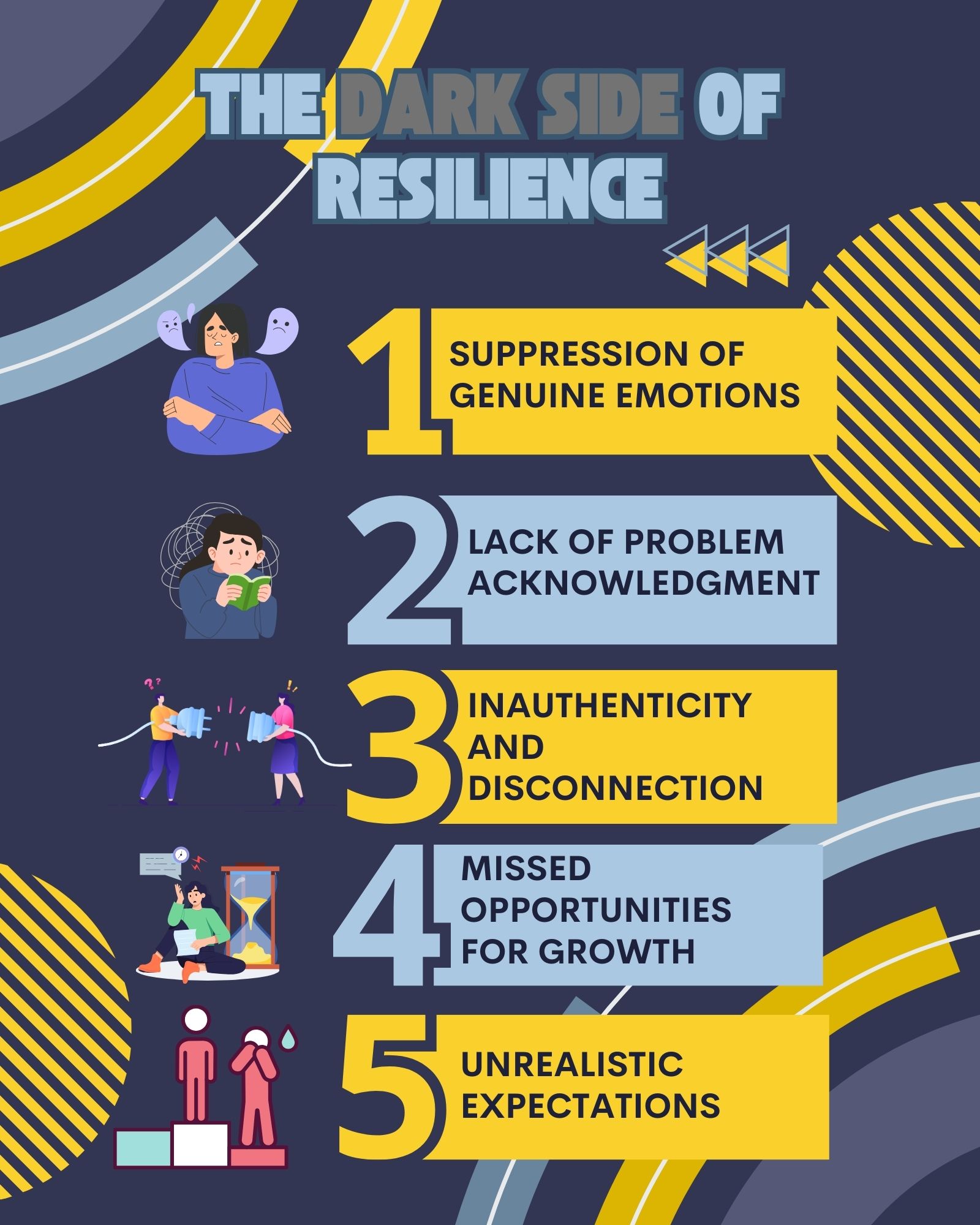- Table of Contents
- Introduction
- What Is Resilience?
- Why Is Resilience Important in Leadership?
- Handling Uncertainty
- Inspiring Others
- Problem-Solving
- Building Trust
- Personal Growth
- What Are the Main Traits of Resilient Leaders?
- Emotional Intelligence
- Adaptability
- Optimism and Positivity
- Decisiveness
- Strong Communication Skills
- How to Become a More Resilient Leader
- Cultivate a Growth Mindset
- Enhance Emotional Intelligence
- Prioritise Self-Care
- Seek Support and Learn from Others
- Practice Mindfulness and Stress Management
- Creating a Cohesive Team Through Resilience
- Set Clear Expectations
- Foster Psychological Safety
- Encourage Learning and Growth
- Celebrate Success and Learn from Failure
- Lead by Example
- The Role of Resilience in Organisational Culture
- The Dark Side of Resilience
- Suppression of Genuine Emotions
- Lack of Problem Acknowledgment
- Inauthenticity and Disconnection
- Missed Opportunities for Growth
- Unrealistic Expectations
- Strategies for Balancing Resilience and Authenticity
- The Future of Resilient Leadership
- Technological Advancements
- Crisis Preparedness
- Diversity, Equity, and Inclusion
- Sustainable Leadership
- Mental Health and Well-Being
- Lifelong Learning
- Global Collaboration
- Ethical Leadership
- Conclusion
Introduction
Leadership is not for the faint-hearted. It requires unique skills to navigate the turbulent seas of change and uncertainty. At the core of effective leadership lies resilience—a trait that empowers leaders to rise above setbacks, adapt to new realities, and inspire their teams to achieve greatness. In this comprehensive exploration of resilient leadership, we will delve into the world of resilience, its significance in leadership, the essential traits of resilient leaders, strategies for personal development, and creating cohesive teams that thrive in adversity.
What Is Resilience?
Resilience is the capacity to bounce back from setbacks, adversity, and stress. It is the ability to withstand and recover from difficult experiences while maintaining one's well-being. Resilience goes beyond mere survival; it empowers individuals to thrive and grow despite challenging circumstances. In the context of leadership, resilience becomes a crucial factor in managing teams, making strategic decisions, and driving organisational success.
Why Is Resilience Important in Leadership?
Understanding the profound impact of these challenges and exploring why resilience is not just a desirable trait but a vital attribute of ineffective leadership becomes imperative. According to the European Hotel Management School (EHL), it has become even more vital post-COVID.
Handling Uncertainty
In an ever-changing business environment, leaders must be able to navigate ambiguity and make informed decisions in the face of uncertainty. Resilient leaders embrace change as an opportunity and excel in helping their teams adapt to it. They understand that change can lead to innovation and growth and use it as a springboard for new strategies. By displaying a calm and composed demeanour in turbulent times, they become beacons of stability, instilling confidence in their teams and stakeholders.
Inspiring Others
A leader's resilience profoundly impacts the team's morale and motivation. When faced with adversity, resilient leaders remain composed, maintain a positive outlook, and inspire their teams to persevere. They are more than just problem solvers; they are unwavering sources of support and encouragement. Their ability to lead by example, demonstrating strength and determination in the face of challenges, is a powerful motivator encouraging their teams to follow suit. This inspiration often translates into improved productivity, higher job satisfaction, and lower turnover rates.
Problem-Solving
According to an article by Jason Eliot, leaders who possess a high level of resilience can effectively respond to organisational crises. Through their demonstration of resilience and positive reactions, they can elevate others' level of resilience. Resilient leaders possess a problem-solving mindset that extends beyond finding quick fixes. They approach challenges as learning opportunities, identifying creative solutions that address the root causes of issues. By doing so, they encourage a culture of continuous improvement within their teams. This approach also promotes innovation, as team members are encouraged to think outside the box, knowing their leader values creative problem-solving. Consequently, resilient leaders foster an environment where challenges are obstacles and stepping stones to greater achievements.
Building Trust
Resilient leaders establish trust by demonstrating their ability to handle crises effectively. Their composure, transparency, and commitment to finding solutions inspire confidence among team members. When faced with adversity, they don't hide the truth or sugarcoat the situation; instead, they communicate openly and honestly. This transparency fosters a culture of trust and collaboration, as team members appreciate leaders who are forthright about challenges and actively involve them in finding solutions. Trust is the bedrock upon which resilient teams are built, allowing for smoother navigation through difficulties and greater overall success.
Personal Growth
Resilient leaders view setbacks as opportunities for personal growth and development. They overcome obstacles and actively seek ways to learn from their experiences. By continuously adapting their leadership styles, they encourage personal growth in themselves and others. This commitment to self-improvement inspires team members to embrace change and self-development as well. The culture of growth cultivated by resilient leaders creates a workforce that is not just resilient but also more adaptable, innovative, and prepared to tackle the challenges of an ever-evolving world.
What Are the Main Traits of Resilient Leaders?
Resilient leaders exhibit several key traits that enable them to thrive in challenging situations. These traits include:
Emotional Intelligence
Resilient leaders are not only in tune with their own emotions but also skilled at understanding and managing the emotions of others. Their high level of self-awareness allows them to recognise when stress or adversity affects their decision-making or interactions with their team. This self-awareness empowers them to take a step back, reevaluate, and make more thoughtful decisions. Moreover, their empathy and ability to connect with team members on an emotional level create a supportive and trusting work environment, where everyone feels valued and heard.
Adaptability
Resilient leaders don't just accept change; they thrive on it. Their adaptability allows them to quickly pivot and adjust their strategies in response to shifting circumstances. They don't cling to outdated plans but are willing to embrace new opportunities and approaches. This flexibility enables their teams to navigate transitions more smoothly, as team members see their leader's willingness to evolve and are inspired to follow suit. Ultimately, adaptability is a hallmark of resilient leaders who understand that change is a constant and that the ability to embrace it is a competitive advantage.
Optimism and Positivity
Resilient leaders maintain a positive outlook, even when faced with adversity. They understand that a negative mindset can hinder progress and drain team morale. Instead, they focus on solutions and possibilities, which helps their teams persevere and find opportunities in challenging situations. Their contagious optimism inspires team members to approach problems with a can-do attitude. By fostering a culture of positivity, resilient leaders create an environment where innovation thrives, as team members are more likely to take calculated risks and explore new avenues for success.
Decisiveness
Resilient leaders make well-informed decisions, even under pressure. They excel at gathering relevant information, assessing various options, and taking decisive action. Their ability to remain composed in high-stress situations ensures they don't succumb to indecision or analysis paralysis. This decisiveness instils confidence in their teams, as team members can rely on their leader to provide clear direction and guidance, especially when faced with critical decisions. Resilient leaders are not afraid to take calculated risks, understanding that inaction can be riskier than thoughtful choices.
Strong Communication Skills
Effective communication is a cornerstone of resilient leadership. Resilient leaders excel in conveying their vision, expectations, and plans clearly and transparently. They listen actively to their team members, valuing their input and feedback. This open and honest communication fosters an environment of trust and open dialogue. Team members feel comfortable approaching their leader with concerns, ideas, or questions, knowing they will be heard and respected. This high level of trust and communication helps teams weather challenges together, collectively tackling obstacles and working towards shared goals.
How to Become a More Resilient Leader
Developing resilience is an ongoing process that requires self-reflection, practice, and the willingness to embrace new perspectives. Here are some strategies to enhance your resilience as a leader:
Cultivate a Growth Mindset
Embrace challenges as opportunities for growth and learning. Adopt a positive attitude towards setbacks and view them as valuable experiences that can fuel personal and professional development. A growth mindset allows you to see failures as stepping stones to success rather than roadblocks. By continuously seeking to expand your skills and knowledge, you become more adaptable and inspire your team to approach challenges with the same enthusiasm for growth.
Enhance Emotional Intelligence
Invest time in developing your emotional intelligence by practising self-awareness, empathy, and effective communication. Understanding your emotions and those of others will help you navigate difficult situations with greater empathy and clarity. Emotional intelligence allows you to connect with your team on a deeper level, fostering trust and open communication. When your team sees that you value their emotions and well-being, they are likelier to follow your lead and remain resilient during tough times.
Prioritise Self-Care
Take care of your physical and mental well-being. Ensure you get enough sleep, exercise regularly, and make time for activities that rejuvenate and relax you. Prioritising self-care helps build resilience and enables you to lead with energy and focus. When you lead by example in self-care, you clearly message your team about the importance of balance and well-being. This can lead to a healthier and more resilient work culture where employees are encouraged to take care of themselves, which, in turn, positively impacts their ability to weather challenges.
Seek Support and Learn from Others
Surround yourself with a strong support network, including mentors, coaches, and peers. Engage in meaningful conversations, share experiences, and seek advice to broaden your perspectives and learn from the wisdom of others. Learning from the experiences of those who have faced similar challenges can provide valuable insights and shortcuts to building resilience. Moreover, by fostering a culture of mutual support and mentorship within your team, you create an environment where everyone can contribute to each other's resilience and personal growth.
Practice Mindfulness and Stress Management
Incorporate mindfulness techniques into your daily routine to cultivate a calm and focused mindset. Engage in stress-reducing practices such as meditation, deep breathing exercises, or journaling to manage stress effectively. These practices enhance your ability to handle pressure and serve as examples for your team. When team members see their leader managing stress and maintaining composure, they are more likely to adopt similar practices. This collective commitment to stress management can transform the team into a more resilient and harmonious unit, capable of overcoming adversity together.
Creating a Cohesive Team Through Resilience
Resilient leaders not only embody resilience themselves but also cultivate resilience within their teams. Here are some ways to build a cohesive team through resilience:
Set Clear Expectations
Communicate your expectations, team goals, and the importance of resilience. Encourage open dialogue and guide how team members can contribute to building a resilient culture. When expectations are well-defined, team members clearly understand their roles and responsibilities. This clarity reduces ambiguity and fosters a sense of purpose, which is crucial for resilience. Team members are more likely to stay committed and focused when they know how their contributions fit into the larger picture.
Foster Psychological Safety
Create an environment where team members feel safe taking risks, sharing ideas, and voice concerns without fear of judgement or reprisal. Psychological safety promotes open communication, trust, and collaboration, enhancing the team's collective resilience. When individuals feel psychologically safe, they are more likely to express their thoughts, share their experiences, and admit mistakes. This transparency helps the team identify issues early and work together to find solutions, making the team better equipped to handle adversity.
Encourage Learning and Growth
Create opportunities for continuous learning and development within your team. Offer training programmes, assign challenging projects, and provide constructive feedback encouraging personal and professional growth. Resilience is not a static quality; it thrives in environments where individuals are encouraged to learn and adapt. When team members see that their leader values their growth, they are more likely to embrace change and view challenges as opportunities for development. This proactive approach to learning enhances individual resilience and strengthens the collective resilience of the team.
Celebrate Success and Learn from Failure
Acknowledge and celebrate both individual and team achievements. Additionally, view failures as opportunities for growth and encourage the team to reflect on lessons learned and implement improvements. Celebrating success boosts morale and reinforces a sense of accomplishment, contributing to team resilience. Moreover, team members are more willing to take risks and innovate when failures are addressed constructively and seen as valuable learning experiences. A resilient team doesn't dwell on failures but instead focuses on continuous improvement and adaptation.
Lead by Example
As a resilient leader, embody the traits and behaviours you expect from your team. Demonstrate adaptability, maintain a positive outlook, and handle challenges with composure. Your actions will inspire and motivate your team members to embrace resilience. When team members see their leader displaying resilience in action, they are more likely to follow suit. Your behaviour serves as a model for the team, illustrating how to approach adversity with grace and determination. This modelling effect can significantly enhance the team's overall resilience, creating a cohesive and resilient unit capable of overcoming any obstacle.
The Role of Resilience in Organisational Culture
Resilience is not just an individual trait; it also plays a significant role in shaping an organisation's culture. When embedded within an organisation, resilient leadership sets the tone for how challenges are approached and handled collectively.
Benefits | Description |
Increased Adaptability | Organisations with a resilient culture are better equipped to adapt to changing circumstances and market shifts |
Enhanced Employee Well-Being | A resilient workplace fosters a sense of security and support, leading to improved mental and emotional well-being. |
Improved Problem Solving | Teams in a resilient culture are more likely to approach problems with creativity and a solution-oriented mindset. |
Higher Employee Engagement | Resilience prompts open communication, trust and a sense of belonging, leading to higher levels of engagement |
Enhanced Decision-Making | Leaders in resilient organisations make well-informed decisions, even under pressure, driving strategic success. |
Table 1: Benefits of a Resilient Organisational Culture
The Dark Side of Resilience
While resilience is undoubtedly a valuable trait, it's essential to acknowledge that an excessive focus on resilience can have its downsides. This phenomenon, known as "toxic positivity," occurs when individuals or organisations overly emphasise staying positive and avoiding negative emotions, even in the face of significant challenges.

Suppression of Genuine Emotions
One risk associated with an overly resilient approach is the suppression of genuine emotions. When individuals feel pressured to maintain a perpetually positive facade, they may bury their real feelings, leading to emotional suppression and, eventually, burnout. In the workplace, this can manifest as a reluctance to admit stress, anxiety, or dissatisfaction, which prevents problems from being addressed effectively.
Lack of Problem Acknowledgment
Toxic positivity can fail to acknowledge critical problems or issues. When leaders and team members focus solely on maintaining a positive outlook, they may dismiss or downplay legitimate concerns, believing that acknowledging problems will undermine resilience. This avoidance of reality can hinder effective problem-solving and lead to unresolved issues festering beneath the surface.
Inauthenticity and Disconnection
In environments where toxic positivity prevails, individuals may feel compelled to present an inauthentic version of themselves. They hide their struggles and vulnerabilities, creating a facade of perfection. This inauthenticity can erode trust within teams and organisations, as colleagues may sense the disconnect between the projected positivity and the underlying reality. Building genuine relationships and fostering trust becomes difficult when authenticity is sacrificed to appear resilient.
Missed Opportunities for Growth
A relentless focus on maintaining a positive outlook at all costs can lead to missed opportunities for personal and professional growth. In the quest to avoid discomfort or negative emotions, individuals and organisations may shy away from challenges or difficult conversations. However, it is often through adversity and constructive feedback that the most profound learning and growth occur. By avoiding these opportunities, individuals and organisations may limit their potential for improvement.
Unrealistic Expectations
Toxic positivity can foster unrealistic expectations about the nature of success and achievement. When resilience is equated with a perpetual state of positivity and an absence of difficulties, it sets unrealistic standards. Team members may feel pressure to achieve constant success and happiness, leading to feelings of inadequacy when they inevitably encounter setbacks. This unattainable standard can be demoralising and counterproductive.
Strategies for Balancing Resilience and Authenticity
To strike a healthy balance between resilience and authenticity, leaders and organisations should:
- Encourage Open Dialogue: Foster an environment where team members feel comfortable expressing their genuine emotions and concerns. Encourage open and honest conversations about challenges and difficulties.
- Normalise Setbacks: Promote the idea that setbacks and failures are part of the learning process. Emphasise that it's okay to experience negative emotions in response to challenges.
- Provide Support: Offer resources and support for managing stress, building resilience, and addressing mental health issues. Ensure team members can access tools and strategies to cope with adversity.
- Embrace Constructive Feedback: Encourage a culture of feedback and growth, where team members are open to giving and receiving constructive criticism. Feedback should be seen as an opportunity for improvement, not a threat to resilience.
- Lead by Example: Leaders should demonstrate authenticity by sharing their own struggles and challenges. This vulnerability can create a culture of trust and authenticity within the organisation.
- Promote Work-Life Balance: Encourage a healthy work-life balance to prevent burnout and emotional exhaustion. Recognise the importance of self-care and well-being.
- Celebrate Effort, Not Just Outcomes: Recognise and celebrate the effort and hard work put into overcoming challenges, regardless of the outcome. This can reduce the pressure to achieve constant success.
Balancing resilience and authenticity allows individuals and organisations to harness the benefits of resilience while acknowledging the importance of genuine emotions and authentic relationships.
The Future of Resilient Leadership
The importance of resilient leadership is set to grow in an increasingly complex and uncertain world. Leaders who can navigate change, inspire their teams, and foster cultures of resilience will be better equipped to thrive in the face of unprecedented challenges. Here, we delve into the future of resilient leadership, exploring emerging trends and key considerations.
Technological Advancements
The future of resilient leadership will be intricately linked with technological advancements. Rapid developments in artificial intelligence (AI), data analytics, and automation will continue to reshape industries and workforces. Resilient leaders will need to embrace these technologies and navigate their ethical and societal implications. Adapting to a tech-driven landscape and ensuring the well-being of employees in the face of automation will be a significant challenge for leaders.
Crisis Preparedness
In recent years, the world has experienced a series of unexpected crises, from the COVID-19 pandemic to climate-related disasters. Resilient leaders of the future will prioritise crisis preparedness and response. They will implement robust contingency plans, ensure remote work capabilities, and invest in digital infrastructure to maintain business continuity during disruptions. Moreover, they will emphasise the importance of mental health support and well-being programmes to help employees cope with the emotional toll of crises.
Diversity, Equity, and Inclusion
Resilient leadership in the future will centre around diversity, equity, and inclusion (DEI). Leaders will recognise the value of diverse perspectives in building resilient teams and organisations. They will actively promote DEI initiatives, create inclusive cultures, and address systemic inequalities within their organisations. Resilience refers to an organisation's ability to bounce back from challenges and its capacity to adapt and thrive in a diverse and rapidly changing world.
Sustainable Leadership
Sustainability will be a key driver of resilient leadership in the future. As environmental and social concerns take centre stage, leaders will be expected to adopt sustainable practices and prioritise corporate social responsibility. Resilient leaders will integrate sustainability into their strategies, recognising that environmental and social issues can present both risks and opportunities. They will work to build sustainable, environmentally conscious organisations that are better equipped to withstand global challenges.
Mental Health and Well-Being
The future of resilient leadership will place an even greater emphasis on mental health and well-being. Leaders will acknowledge the impact of work-related stress and prioritise mental health support. Resilience will no longer be solely about bouncing back from setbacks but also about fostering a workplace culture that supports the mental and emotional well-being of employees. Initiatives such as mindfulness programmes, employee assistance programmes, and mental health awareness campaigns will become standard practices.
Lifelong Learning
In a rapidly changing world, the concept of lifelong learning will become integral to resilient leadership. Leaders of the future will continuously update their skills and knowledge to stay relevant and adaptive. They will encourage their teams to embrace a growth mindset and invest in ongoing learning and development. Resilient leaders will recognise that learning is a cornerstone of adaptability, and they will create opportunities for employees to acquire new skills and stay ahead in their respective fields.
Global Collaboration
Global challenges, such as pandemics and climate change, require a global response. Resilient leaders of the future will engage in international collaboration and partnerships to address these issues. They will recognise that no organisation or country can thrive in isolation and will work collectively to find solutions. Building international networks and alliances will be a hallmark of resilient leadership in a world interconnected by technology and shared challenges.
Ethical Leadership
Ethical leadership will continue to gain prominence in the future. Resilient leaders will uphold high ethical standards, demonstrate transparency, and prioritise integrity in their decision-making. They will recognise that ethical lapses can lead to reputational damage and erode trust, which are critical components of resilience. Ethical leadership will be synonymous with resilient leadership, as organisations seek leaders who can weather storms with their integrity intact.
In summary, the future of resilient leadership is marked by a confluence of technological advancements, crisis preparedness, diversity, equity, sustainability, mental health support, lifelong learning, global collaboration, and ethical leadership. Leaders who embrace these trends and adapt to the evolving landscape will not only navigate challenges effectively but also position their organisations for long-term success in an increasingly complex world. The resilient leaders of the future will be those who not only bounce back from adversity but also proactively shape a better and more resilient world for all.
Benefits of Technological Advancements on Resilient Leadership |
Enhanced Crisis Response and Preparedness |
Improved Remote Work and Collaboration |
Data-Driven Decision-Making |
Advanced Learning and Skill Development |
Global Connectivity and Collaboration |
Automation for Efficiency and Adaptability |
Enhanced Communication and Information Sharing |
Conclusion
Resilient leadership is not just a skill; it's the superpower you need to conquer today's dynamic and unpredictable world. By mastering the art of resilience, you'll navigate challenges with grace and inspire your teams to achieve extraordinary success, even in the face of adversity.
But here's the exciting part: you don't have to embark on this journey alone. Elevate your leadership to new heights by enrolling in our transformative course, ‘Developing Emotional Resilience in the Workplace.’ This course will unlock the secrets to harnessing emotional resilience as your ultimate professional advantage.
Picture yourself confidently leading your team through uncertain times, making informed decisions, and fostering a workplace culture where resilience thrives. It's not just a course; it's your ticket to becoming the resilient leader you were meant to be.
Don't miss out on this opportunity to supercharge your leadership skills. Embrace resilience, seize success, and enrol in our course today! Your resilient future starts now.


























